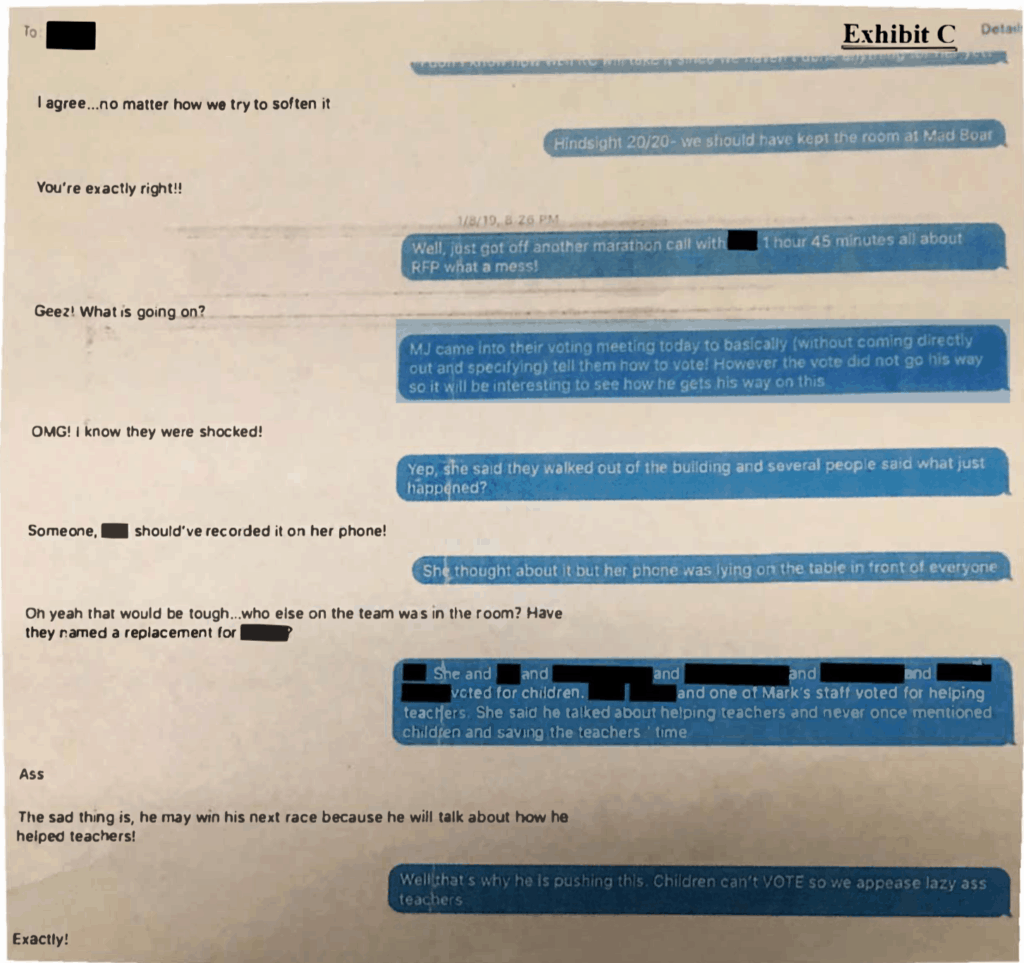

The controversy surrounding the state’s choice on how to assess K-3 readers is far from over. Department of Information Technology (DIT) General Counsel Jonathan Shaw granted a motion Thursday for reconsideration of the stay that is stalling the contract between the Department of Public Instruction (DPI) and Istation — the vendor the state chose in June to measure reading proficiency as part of the state’s Read to Achieve legislation.
After the state’s Istation choice was announced, Amplify, whose product the state had been using in recent years, protested that decision. More than 400 teachers responded to an EdNC.org survey on the switch, raising concerns that Istation is not developmentally appropriate for young children, lacks appropriate dyslexia screening measures, and would not provide reliable data to inform reading instruction. Questions were raised around the procurement process as DPI released documents showing Amplify was ranked as the better vendor multiple times. In August, DIT ordered a stay, putting the contract on hold until the decision and the process that led to that decision are reviewed. The parties met in court this week to argue whether or not the contract should have been put on hold.
Why does this matter? Reading scores have not improved in years despite the state’s multi-million dollar efforts to increase third-grade proficiency — a benchmark that research says is closely tied to high school graduation. As the school year goes on, the question over which tool to use to measure young readers is suspended in a legal battle that is just getting started.
DPI and Superintendent of Public Instruction Mark Johnson have remained firm in their choice of Istation. Since the August 19 stay was granted, Istation agreed to continue providing their product and training services to the state for free.
All parties have a week to submit proposed decisions to Shaw on whether the stay should be lifted, maintained, or amended.
“Now let’s focus on whether the stay is appropriate or not,” Shaw said. “So we’re either going to remove the stay, amend the stay, or leave the stay like it is. So that’s the three issues that should be addressed.”
Starting on December 9, the parties will argue on the actual merits of the case, meaning whether the state’s procurement process was valid and its decision to go with Istation met the state’s RFP requirements.
“We’re pleased that the expedited schedule is being entered, which is what we’ve been requesting from day one, so that we can get to a decision on the merits, because we feel strong about the merits of the protest,” said Mitch Armbruster, an attorney representing Amplify.
Special Assistant Attorney General Tiffany Lucas, who is representing DPI, said the state is confident in its process and decision.
“If and when there’s an opportunity to fully flesh this out, a hearing on the merits, we expect the evidence will show that the procurement process was well-run and ultimately reached the right decision,” Lucas said.
This week, both sides’ arguments focused on whether or not Amplify was likely to succeed in a hearing on the merits of the case and whether or not Amplify would be irreparably harmed without the stay. These are the two standards that Amplify has to meet to justify the stay.
Armbruster argued that Amplify is likely to win by targeting different aspects of the procurement process. He first said the RFP cancellation was improper because DPI gave one reason to DIT for the cancellation and another in their internal records. DIT must approve any RFP cancellation.
DIT’s memorandum, Armbruster argued, said DPI’s reason for cancellation was that the costs between the two top vendors — Istation and Amplify — were so far apart that direct negotiations were needed. However, public records show that the state’s reason for the cancellation was a breach in confidentiality. DPI later released the below photo of a text message exchange between two anonymous individuals about the voting process, claiming this was the breach.
“There’s no documentation that DIT was told there are problems in the process,” Armbruster said.
The exchange implies that Johnson tried to sway the evaluation committee’s voting process. “MJ came into their voting meeting today to basically (without coming directly out and specifying) tell them how to vote! However the vote did not go his way so it will be interesting to see how he gets his way on this,” the message reads.


Beyond DPI giving a different reason to DIT for the cancellation, Armbruster said, it is unclear how the text message chain led to a cancellation.
“It’s never been explained how they determined that this compromised the process,” Armbruster said, later adding, “There’s no evidence that one of the vendors influenced the evaluation committee.”
Armbruster also said that the evaluation criteria used in the final negotiations changed from what was used before the RFP cancellation.
“They changed the weighting of the criteria and they made ‘vendor cost proposal’ and ‘vendor financial stability’ — which they’d already ranked Amplify as worst on — they made them the most important criteria in this procurement,” he said.
Armbruster added that the state, in its original contract award letter, said that Istation was missing key dyslexia measures. Johnson and DPI later said that the product does have the appropriate measures. In her testimony Thursday, Istation President and COO Ossa Fisher also confirmed that the product has the appropriate dyslexia screening measures.
“Their own conclusion was that it did not meet that mandatory requirement of the RFP,” Armbruster said.
Lucas defended DPI’s procurement process, saying that as problems with the process were fixed, it became clear that Istation offered the best solution and the best value for the state.
“Was it a flawless process? I’m not prepared to say that it didn’t have problems,” Lucas said. “We know that there were problems which caused us to have to cancel the second RFP and move forward to the negotiation phase. But were the errors fatal to the process? … We contend not.”
Lucas argued that Amplify lacks evidence that the process was fatally flawed and relies on an affidavit by Amplify CEO Larry Berger simply claiming that the process was flawed.
“Beyond that, there is nothing to indicate that the process was flawed, only Amplify’s musings that the process didn’t work the way it should’ve worked and in fact, what this is really about is that Amplify didn’t win the contract as the incumbent,” Lucas said. “For those reasons, we would contend that Amplify failed to satisfy the first prong of the test, which is to show that they are likely to succeed in the merits of the case.”
On the second prong of that test, Armbruster argued that Amplify’s financial loss could be considered irreparable harm.
Lucas argued that is not usually the case.
“… Under North Carolina law, loss of revenue is not generally deemed to be the type of harm that would justify putting a stay in place or an injunction in place,” Lucas said. She added that Amplify’s contract with the state was already set to expire a few days after the stay was granted. “Again, the complaint of injury that Amplify argues will not necessarily be reversed by favorable decision,” she said.
Both DPI and Istation argued that the real harm of the stay is stalling the work of assessing young readers.
“I can’t imagine that any of us would disagree that making sure the educators have the tools that they need — that equity really weighs in favor of having in place the tools so that these kids can be educated,” said Kieran Shanahan, who was representing Istation.
During her testimony, Fisher said 4-6,000 teachers have already been trained on Istation’s reading assessment tool either in person or on a webinar, and that almost 300,000 K-3 students have been assessed using Istation’s product.
Lucas said some teachers and schools around the state do not know whether they will be punished for using the product while the stay is in place.
“A big part of the work of improving reading proficiency for our youngest learners in our state has been put on pause because schools just don’t know what to do while this stay is in place,” she said.
Armbruster argued that the public interest lies in upholding the integrity of the procurement process and the spending of taxpayer dollars. He said keeping the stay in place and moving forward to a hearing is best for students since the process was a flawed one and the decision will have to be thrown out.
“This is not just a dispute between two bidders,” Armbruster said. “It’s Amplify’s life mission to help kids learn how to read. They’re not just in this for a contract. I don’t think Istation is just in it for a contract either. They both have committed missions. But Amplify’s partly here because there’ve been so many calls and concerns about the outcome of this procurement.”


